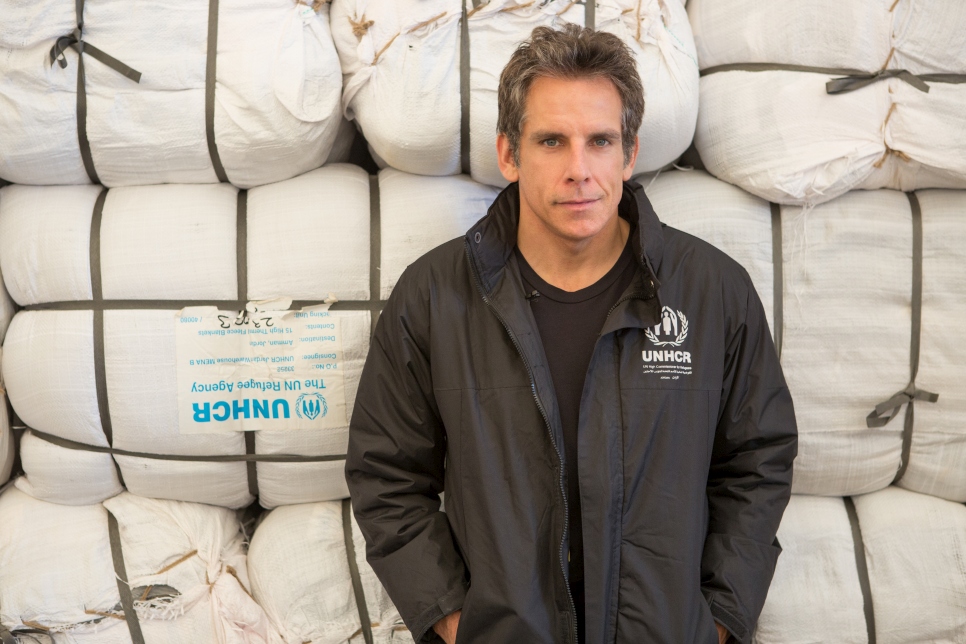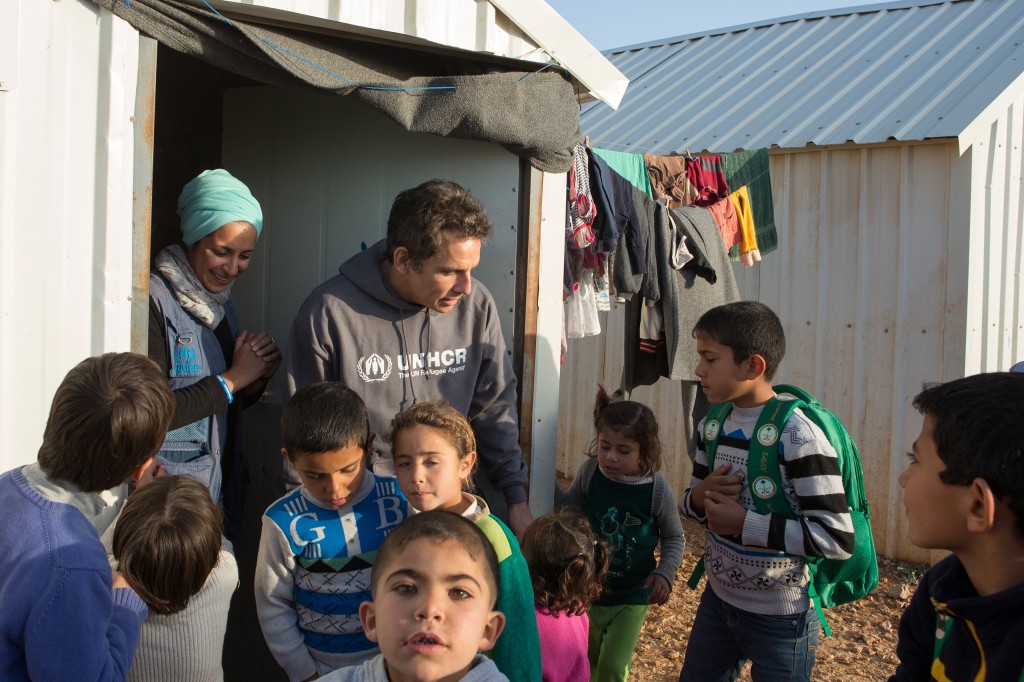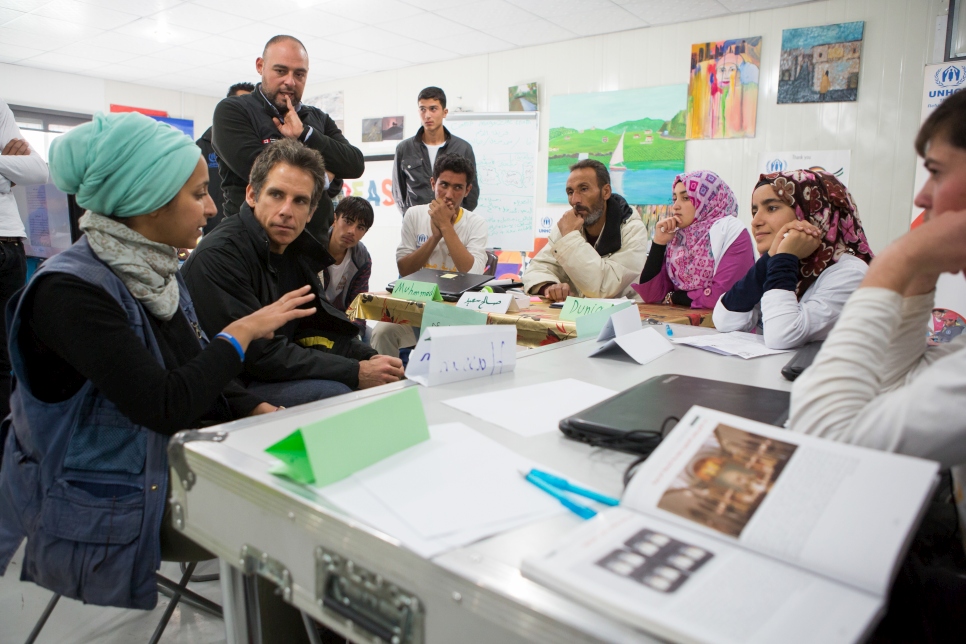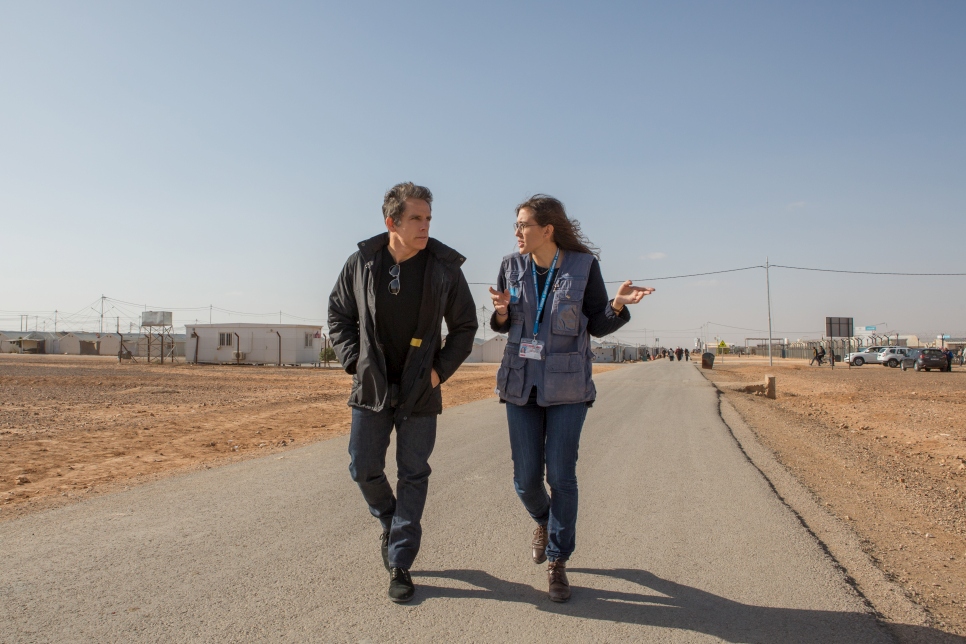
Last week Angelina Jolie published an op-ed in the NY Times detailing the plight of refugees. She outlined the facts including that most refugees are vulnerable women and children, and that statistics show that only 1% of the 65 million displaced people worldwide will achieve resettlement in another country. She explained that prior to the travel ban there was already an extensive and lengthy vetting system in the US for refugees, who go through more background checks and screening than any other visitors. Jolie can write so eloquently about these issues because she’s a special envoy to the UN High Commissioner on Refugees, she’s visited countless camps and she’s done advocacy and humanitarian work for the UN over 15 years. What about celebrities that are just starting to get involved with these issues? Ben Stiller has been involved with UNHCR since early 2016, when he visited refugee families resettled in Berlin. Late last month he visited the Azraq refugee camp in Jordan and has published a first person essay for Time Magazine about his experiences and the people he met there. I have to say that he sounds humbled by what he learned and that he truly wants to help. We do too, that’s why we’re reporting this.
Like a lot of us, I am trying to reconcile how to be open-hearted and empathetic to the plight of our fellow human beings while also being concerned about our national security. The problem is complicated, and sometimes the easiest way to deal with it, which I have personally been guilty of, is to ignore it. We become anesthetized to the constant news of suffering children in Aleppo and horrific violence and destruction in the region. How do we help those in need in a way that makes a difference and doesn’t compromise our safety here and abroad?
I, Ben Stiller, star of Dodgeball, do not have the answer. But by meeting with refugees and those assisting them, I was able to get a better sense of some of the realities.
This was the running theme at Azraq Camp, which sits in the middle of the Jordanian desert. Approximately 54,000 of the 655,000 registered refugees in Jordan from Syria are here. Over half are children. They live in small, anonymous shelters with no electricity (though the solar grid comes online soon), no running water and dirt floors.
This is where I talked to Mohamed and Alaa Salah and their two children. Mohamed is a veterinarian; Alaa, an agricultural engineer. They are both young and vivacious. They fled the carnage when bombs hit their neighborhood in Homs and the trauma damaged their 4-year-old son Hussain’s vision. They are grateful for safety, but stunned by their plight. “I miss my family so much,” Alaa said. “But right now I can’t take my children back to death…”
Every family I met shared a pride for their home country and the hope to live a normal life. While a few were ready to move on to wherever the resettlement process might take them, all professed a profound desire to eventually return home. These are sentiments we — the public — can all connect with. UNHCR’s #WithRefugees campaign is one way in which communities can reflect their compassion.
I hope the new Trump Administration will conclude that compassion and security are not mutually exclusive. On the contrary, they are mutually reinforcing. The roots of the Syria refugee problems are complicated, and so are the solutions. While a resolution of the conflict should be a priority, we must support the humanitarian programs of UNHCR. We need to support our allies like Jordan, who, with an astonishing 20 percent of their population made up of fleeing Syrians, cannot carry the burden alone. What countries like Jordan do profoundly affects us.
In this time of unrest in the Middle East and change in our country, when frustration and xenophobia seem to dominate our news cycle and social media, I hope we can all look at the faces of those we fear and see what is sometimes hardest of all to recognize: ourselves.
I don’t understand how anyone could see the videos of mothers in Aleppo crying for their children who have been murdered, or see the little orphan children shellshocked and looking confused, and not want to help. Those are families and children and people just like us. They’ve gone through hell and they don’t have a place to live or basic necessities. We need to not only lift the Muslim ban, we need to accept and help refugees from war torn countries. As Stiller writes, it’s actually safer to help refugees and people in crisis than to turn them away. You can donate to the UNHCR here and the International Rescue Community here.
Photos credit: UNHCR














Don’t mean to quibble but I wish he’d said ‘confront what we fear’ instead of innovcently reinforcing the dangerous lie that we have a certain group of people to fear. Still, love him for this.
I know 🙁
The lack of compassion is devastating.
And the argument that helping refugees somehow takes away from the citizens (the “who will pay for it?” argument), is so misdirected. The issue is the allocation of tax monies to the salaries of politicians, to wasted efforts like investigations that are just witch hunts.
Or, people just not paying taxes at all.
I don’t know how to make people see that sharing doesn’t take from you, it gives and what you give comes back to you 10 fold. A joy shared is doubled, a sorrow shared is halved. We can do so much to help these people 🙁
Exactly. I think one of the really important points here is that anti Muslim sentiment and treatment actually fuels groups like Isis. This is how they want us to react because it serves their ‘campaign’ and so the policies that Trump et al are trying to enforce are actually making the situation more dangerous.
It’s so sad. I really don’t know how people can look at the pictures and hear the stories and have no empathy. I stopped talking to my stepfather about it because he pretends to have compassion and to think critically about it, but he really doesn’t. He’s one of the “what about the money” people. None of the refugees want to be refugees and move to places against their will. They would love to stay in their countries, but obviously there’s a reason why they can’t. It always comes down to cost, like our countries don’t spend money on humanitarian aid already, as though we don’t waste money on foolishness already, as though the refugees are just going to come and receive assistance forever. My mother actually got annoyed when a few private colleges offered free tuition to a couple hundred new refugees like it’s such a bad thing. I don’t get it. How can we not help. I swear some people would rather just have these people die.
you said everything I wanted to say 🙁
Very nice piece. I think this has a better chance of reaching those who support a “Muslim ban” than AJ’s NYT piece because so many Trump supporters seem gleeful about dismissing the NYT as fake news. Sigh.
In any case, reading Ben’s words reminds me so much of reading/hearing about my dad’s experience as a refugee during WW2. It really wasn’t that long ago…and it breaks my heart that so many people want to turn their backs on those who are suffering in ways we could never imagine.
Incidentally, Australia was my dad’s family’s first immigration choice but they were turned down because my grandfather’s health was less than robust. Canada was appealing to them, too, but they only took single men. So it was the USA that finally welcomed them after their many years of harrowing experiences. And yes, throughout their lives here, many of those who came dreamed of going back to their home country.
I agree that the discussion needs to move away from the political and towards the humanitarian aspect of it. I sometimes don’t know when we decided that our humanity wasn’t a deciding factor in our decision making anymore.
I also think that the national security aspect (not only for the U.S.) is completely blown out of proportion. Refugees are human beings, of course there will be some who are criminals and who might (might!) turn into/turn out to be terrorists. But why does nobody talk about the cost of closing ourselves off? It comes with a price too. And this illusion that we can achieve some form of security by letting millions of refugees rot in unspeakable conditions is ridiculous.
Btw, I love how Ben Stiller uses his Instagram.
Yes, I absolutely agree with everything you’ve said. And I need to check out Stiller’s IG! Thanks.
I started following him when he began promoting Zoolander 2 because he essentially turned it into Derek’s IG. Now he’s wiped it clean to advocate for refugees. It’s probably not how IG is supposed to be used but it’s such a smart way for a celeb to do it.
I am seriously considering this:
https://www.homesforsyrians.uk/
Oh I love this! I wonder if they have anything similar in US? Going to look.
Good for you if you do it!
I like his efforts and believe he’s on the right track. I heard a Trump voter say recently, when asked if she cared about the suffering of refugees, that “emotions can kill you”. In other words, she was being purposely cold. Yet, she failed to see Trump was tugging at her emotions all along to make her ever-more fearful … and still does now that he is so-called president.
You know, I was watching an interview with four women Trump voters. And they answered a question similarly, that “you can’t lead by emotions”. Such a lack of empathy in those women. How can anyone not be affected by plight of refugees?
There was a severe power outage somewhere not far from here and a bunch of refugees wanted to show their appreciation to ththe community so they went about serving meals and such. It’s not like this is a zero sum game.
It takes a lot of courage to be this honest with yourself. Good for Ben.
There has been a refugee crises for god knows how long? Where have the celebrities been all this time? Only a few have been in it for the long haul, but it has to reach this point for more to get involved? Good for ben, but why does it have to reach this point to get involved? They have the money & the time to put in so why only now? This issue has been brewing for sometime & they didn’t care then. I remember an interview Angelina gave in about 2002-03 where she said she held a fundraiser in her home & invited a lot of hollywood & hardly none donated any money & she said how disapointed she was with them & she had to make up the rest of the final donation sum herself. A lot of it seems like a phase with them.
Great to see a celebrity like that to try and help by using the platform they’ve built
Thank you, Ben Stiller! I will donate. Our empathy is part of what helps us to overcome our darker natures. We could be the refugees one day. I would be happy to host refugees in my home.